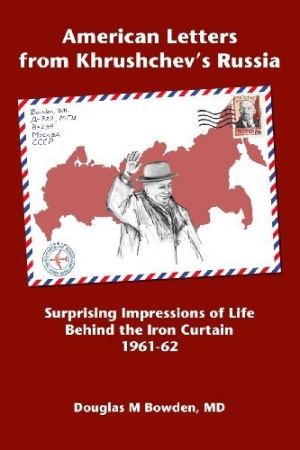American Letters from Khrushchev's Russia
Surprising Impressions of Life Behind the Iron Curtain 1961-62
This behind-the-scenes look at day-to-day life in Soviet Russia is both illuminating and humorous in its candid, casual approach.
A candid look at daily life in the former Soviet Union from the perspective of a foreign exchange student, this informative collection of letters (written while the author was in Russia) reveals the good and the bad behind the Iron Curtain.
A medical student from Stanford University, Douglas Bowden spent one year at Moscow State University from 1961 to 1962. While it is often perceived as a sinister place, Bowden’s letters debunk extreme impressions of the Soviet Union. By interpreting his own correspondence from a half century ago, Bowden provides an honest evaluation of an environment most Americans would find dreary and intolerable.
A focus on the human as opposed to the political—a technique that requires tact as well as maturity—places this work on a sophisticated plane, setting it apart from long-winded tirades on the dangers of communism or the evils of capitalism. Without question, the opinions expressed indicate that the author was less than pleased with what he discovered during his stay, yet his descriptions bring to light the people and the lifestyle, not just a system of government.
This memoir is a fascinating glimpse into the workings of a competitive country at a time when the majority of Americans were allowed only a distant view. Filled with curious details and funny incidents, every page presents a real-life, sometimes even mundane, aspect of existence in Russia during the Cold War era.
Certain descriptions are priceless: “If I eat in the students’ cafeteria, the food is lousy—i.e., about what you’d expect at an average US mental institution,” or “One good thing you can say about the Soviet Union: it is one place where there’s no danger of Christmas becoming commercialized. In fact, there’s little danger of Christmas period.”
Bowden adds a human element to his firsthand observations, allowing the reader to experience vicariously the daily annoyances and idiosyncracies. Endless waiting, a typical part of any Soviet day, could prove tiresome: “where we have lines, they have two or more: one to get to the counter to determine the price, a second at the cash register to pay, a third at the counter to pick up the purchase.” The system of government was, simply put, inefficient. Unemployment may have been low, but adding “steps” to every process slowed procedures down to the point of disruption.
Now a neuroscientist at the University of Washington, Bowden considers the time he spent in Moscow a privilege, yet he remains an outspoken critic of communism in this memoir. He is the author and coauthor of numerous textbooks.
American Letters from Khrushchev’s Russia is an important contribution to Soviet studies, for it presents an individual series of impressions as opposed to a broad-based analysis. The informality will intrigue those seeking unusual details that are often deemed unimportant by scholars.
Reviewed by
Julia Ann Charpentier
Disclosure: This article is not an endorsement, but a review. The publisher of this book provided free copies of the book and paid a small fee to have their book reviewed by a professional reviewer. Foreword Reviews and Clarion Reviews make no guarantee that the publisher will receive a positive review. Foreword Magazine, Inc. is disclosing this in accordance with the Federal Trade Commission’s 16 CFR, Part 255.

